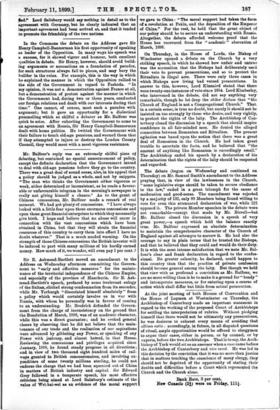In the Commons the debate on the Address gave Sir
Henry Campbell-Bannerman his first opportunity of speaking as leader of the Opposition. In many ways his speech was a success, for it showed vigour and humour, both excellent qualities in debate. Sir Henry, however, should avoid build- ing arguments or accusations on a foundation of paradox, for such structures always fall to pieces, and may bury the builder in the ruins. For example, this is the way in which he explained the manner in which the Opposition rallied to the side of the Government in regard to Fashoda. " In my opinion, it was not a demonstration against France at all, but a demonstration of protest against the manner in which the Government had, during two or three years, conducted our foreign relations and dealt with our interests during that time." One cannot, of course, meet such a paradox with argument; but it gave an opportunity for a dialectical pummelling which so skilful a debater as Mr. Balfour was quick to seize. After exhorting the Government to come to an agreement with Russia, Sir Henry Campbell-Bannerman dealt with home politics. He twitted the Government with their failure to touch old-age pensions, and warned them that if they attempted to injure or destroy the London County Council, they would meet with a most vigorous resistance.






































 Previous page
Previous page